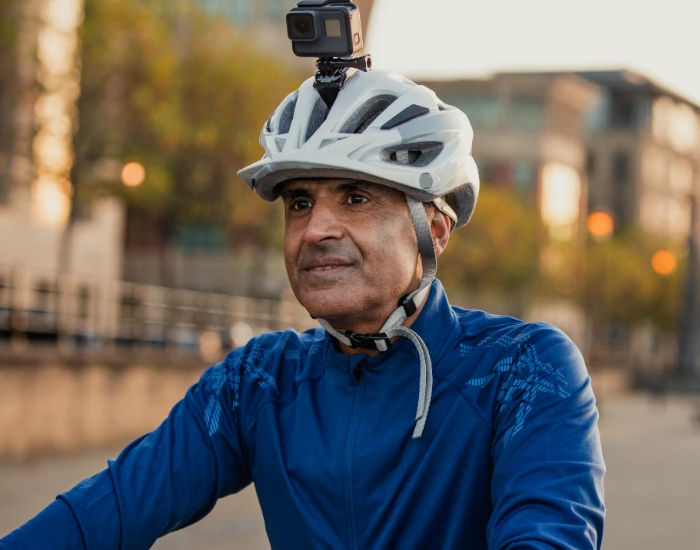
Cycling is one of the most dangerous forms of transportation. According to the Department for Transport (DfT), 111 cyclists were killed, 4,353 were seriously injured and 11,994 were slightly injured on Britain’s roads in 2021.
Establishing liability
Cyclists face many hazards on the road, from reckless drivers to poorly maintained roads, and it can be challenging to prove fault in the event of an accident.
To help improve their safety on the roads, cyclists are increasingly turning to technology.
Helmet mounted-cameras record video footage from the perspective of the cyclist. Helmet cameras can capture anything from reckless drivers to dangerous potholes, helping to establish the circumstances that contributed to an accident.
These cameras have increased in popularity over recent years in a bid to record, and expose, poor road usage.
Can cycle helmet camera footage be used as evidence in a personal injury claim?
The answer is yes. In recent years, cycle helmet camera footage has become increasingly valuable as evidence in personal injury claims.
Cameras can provide crucial evidence to help establish liability and footage is admissible in a civil court. Other camera footage that might also support your claim could have been recorded by:
- car dashcams
- public transport CCTV
- CCTV in nearby shops
- mobile phone footage taken by witnesses
- helmet cameras worn by other cyclists or motorcyclists
In personal injury claims involving cycling accidents, the primary challenge is often proving who was at fault for the accident. Cycle helmet camera footage can provide clear visual evidence of the incident, including the movements of both the cyclist and any other parties involved. This evidence can help establish fault and determine liability, which can be critical to a successful personal injury claim.
In addition to proving fault, cycle helmet camera footage can also be used to help show the severity of injuries sustained in the accident. The footage can provide a clear view of the impact of the collision and the injuries sustained by the cyclist.
See also:
The role of evidence in a successful cycling injury claim
Strengthening your claim
A good argument can be made stronger if it is supported with evidence. Without evidence, a claim often comes down to "your word against theirs."
Common forms of evidence in a cycling accident claim include police reports, photographs of the scene of the accident and witness statements.
Don’t edit the footage
The admissibility of cycle helmet camera footage as evidence depends on a variety of factors. For instance, the footage must be relevant to the claim, and the court must consider whether it is reliable and accurate. If the footage has been edited or tampered with in any way, it will cast doubt over the reliability of the footage.
It is therefore recommended that cyclists who use helmet cameras ensure that the footage they capture is of high quality and that it is not edited in any way.
How will the evidence be used?
When you instruct a personal injury solicitor, they will review the footage with you in detail. Your solicitor will need to confirm that:
- the video is of sufficient quality to support a claim
- the footage clearly shows the cause of the accident. For example, if you are clipped from the rear, it is unlikely that a helmet camera will capture any useful footage of the incident
- the footage establishes the other party's liability
If your solicitor feels that the helmet camera footage fails to establish these points, the footage won’t be presented as evidence. Instead, your solicitor will collate other evidence to support your claim.
Can camera footage help to negotiate an early settlement?
If the footage is clear, the defendant’s insurer is unlikely to contest liability. Insurance companies are commercially pragmatic and they are unlikely to want to incur the expense of a trial if there is video evidence clearly showing that the defendant was at fault.
In this scenario, it is likely that the defendant and their insurer will accept liability and seek to negotiate an out-of-court settlement. Court proceedings would only be necessary if damages could not be agreed.
Helping you get the compensation you need
Cycle helmet camera footage can be a valuable tool in personal injury claims involving cycling accidents. Footage can provide crucial evidence to help establish liability and determine the severity of injuries sustained.
Our expert cycling accident solicitors understand the importance of evidence, including helmet camera footage, in supporting your claim.
With extensive experience in handling no win, no fee cycling claims, we’ll help you navigate the legal process and assess how best to use available evidence to strengthen your case. Our team will fight for the best compensation award, including arranging rehabilitation and interim payments if needed.

 Written by Chris Salmon on 21st February 2023
Written by Chris Salmon on 21st February 2023
